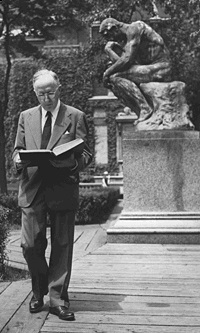Irwin Edman (1896 – 1954) mét Spinoza naturalistisch filosoof
"Spinoza occupies a place in the history of philosophy as curious as it is famous. There is probably no thinker more widely known to the general reading public and no work actually less read."
Deze woorden schreef deze filosoof in een recensie van het boek van Harry Austryn Wolfson in The New York Times van 22 juli 1934. Ik wil ze hier doorgeven en vasthouden - omdat ze nog steeds gelden.
 Irwin Edman was filosoof en dichter die boeken voor collega’s schreef, b.v. over de filosofie van Santayana, maar ook voor een breed publiek van geïnteresseerde lezers boeken als The Contemporary and His Soul, Candle in the Dark, Philosopher's Holiday, en Philosopher's Quest. Hij bleef met zijn filosofische interesse dicht bij de praktische problemen van het leven. Hij doceerde aan de Columbia Universiteit van 1920 – 1954. Een van z’n gezegdes zou geweest zijn [cf]:
Irwin Edman was filosoof en dichter die boeken voor collega’s schreef, b.v. over de filosofie van Santayana, maar ook voor een breed publiek van geïnteresseerde lezers boeken als The Contemporary and His Soul, Candle in the Dark, Philosopher's Holiday, en Philosopher's Quest. Hij bleef met zijn filosofische interesse dicht bij de praktische problemen van het leven. Hij doceerde aan de Columbia Universiteit van 1920 – 1954. Een van z’n gezegdes zou geweest zijn [cf]:
De kop van de bespreking door Irwin Edman over “Professor Wolfson's Long-Awaited Book Is a Work of Illuminating Scholarschip,” luidde: “The Unique and Powerful Vision of Baruch Spinoza”. Hij begon aldus:
“SPINOZA is one of those philosophers upon whom no amount of investigation is superfluous and no genuine inquiry without illumination. When the investigation is of such magistral scholarship and pointed clarity as this long-awaited work of Professor Wolfson of Harvard University, it is of moment that it be called to the attention of all laymen with the least pretensions to philosophy.” [..] Daarna volgden de al aangehaalde zinnen:
"Spinoza occupies a place in the history of philosophy as curious as it is famous. There is probably no thinker more widely known to the general reading public and no work actually less read."
 Dat hij af en toe wel “iets aan Spinoza deed” blijkt uit deze titels:
Dat hij af en toe wel “iets aan Spinoza deed” blijkt uit deze titels:
Irwin Edman, “Poetic Insight and Religious Truth," In: Septimana Spinozana (1933), pp 162-177
Irwin Edman, “The Unity of Spinoza's Thought: The Philosophy of Spinoza.” Intercollegiate Menorah Association, 1929 (4 pagina's)
In het 4e hoofdstuk van zijn Four Ways of Philosophy, [Henry Holt, New York, 1937] lichtte hij de positie van het filosofisch naturalisme toe. [cf hier] Daarin behandelde hij onder meer Spinoza. Hij begon met: “The order of ideas,” said Spinoza, “and the order of nature are one.” “The order of my ideas and the order of nature,” each philosopher also happily assumes, “are one.”
Maar zó opgeschreven lijkt het net alsof de ideeën niet tot de natuur zouden behoren; dus die tegenstelling geeft Spinoza m.i. niet juist weer - je komt dit vaker tegen.
Bij een diner in Hotel Plaza op 24 november 1932 ter herinnering aan de 300e geboortedag van Spinoza, georganiseerd door een comité waarin zitting hadden Governeur Lehman, Supreme Court Justice Cardozo, voormalig rechter Joseph M. Proskauer, Adolph Lewisohn, Walter Lippman, Walter S. Paley, Herbert Bayard Swope, Daniel Frohman, Otto H. Kahn en Lillian D. Wald. Daarbij was Edman onder de sprekers: Prof. Irwin Edman, Benjamin De Casseres [cf blog], Dr. A. A. Brill, Dr. A. Wolfson [cf blog] en Frederick Kutner. [cf hier]
Interview met prof. Irwin Edman, waarin hij ook enige malen naar Spinoza verwijst [cf hier - van hier ook de eerste foto]

